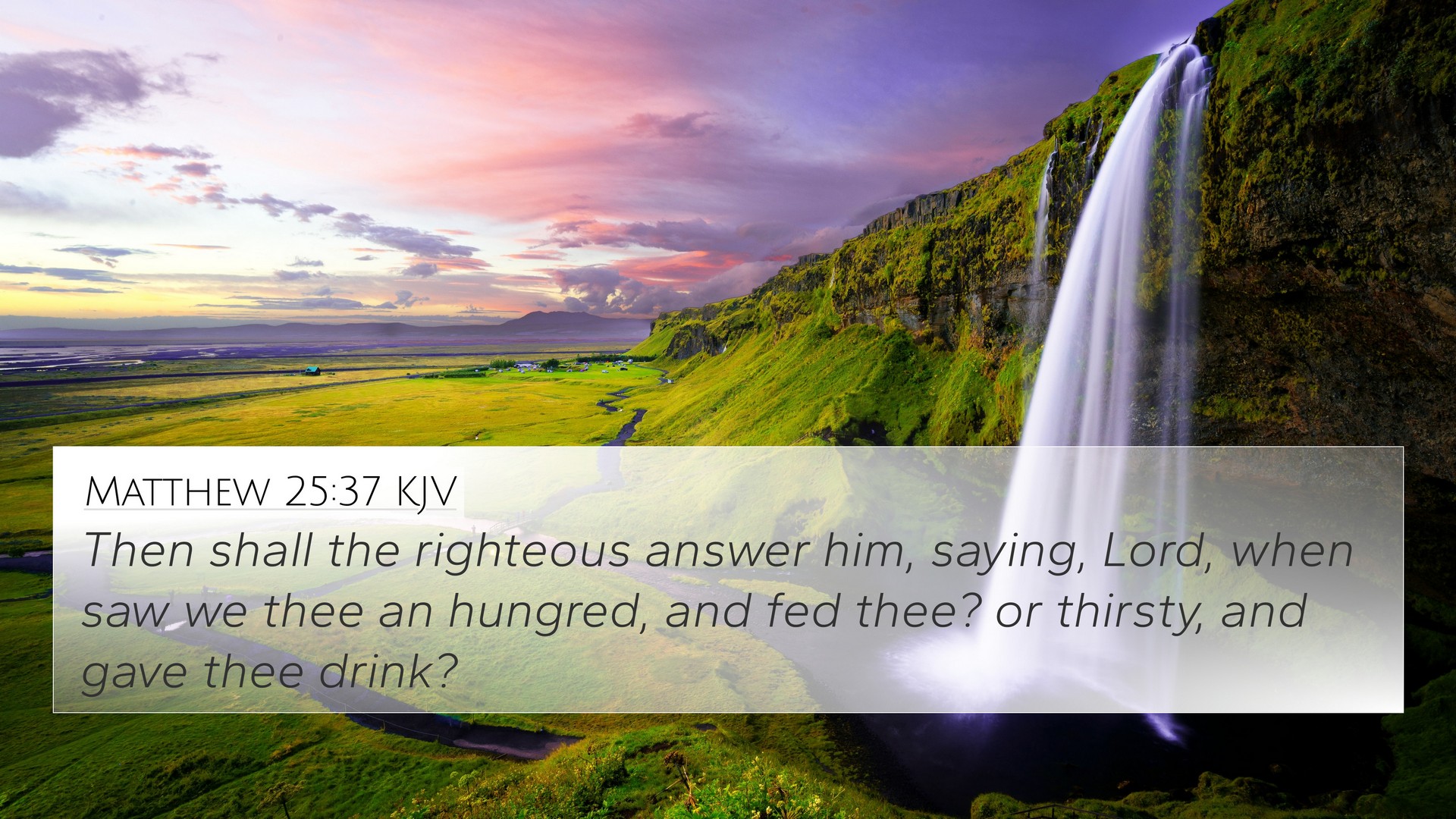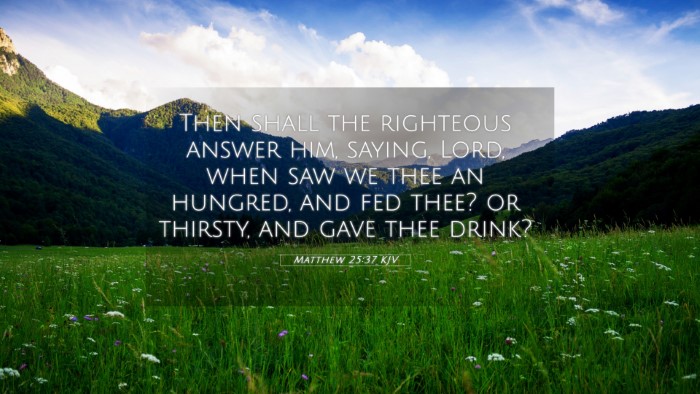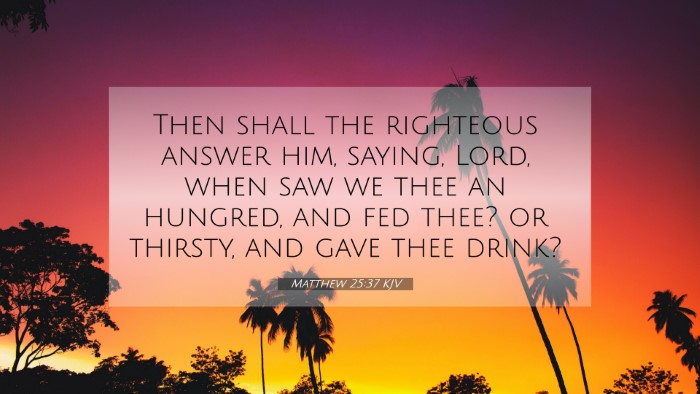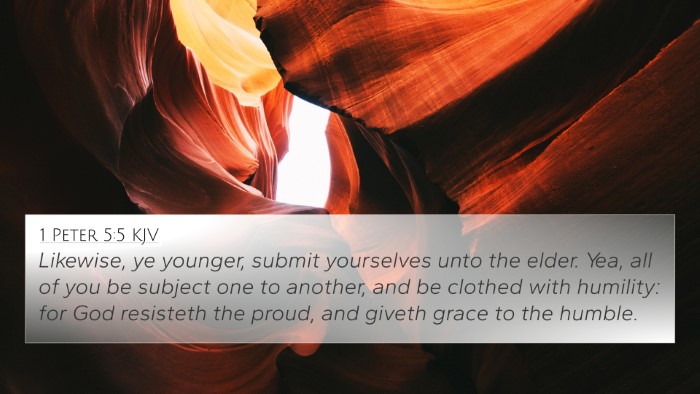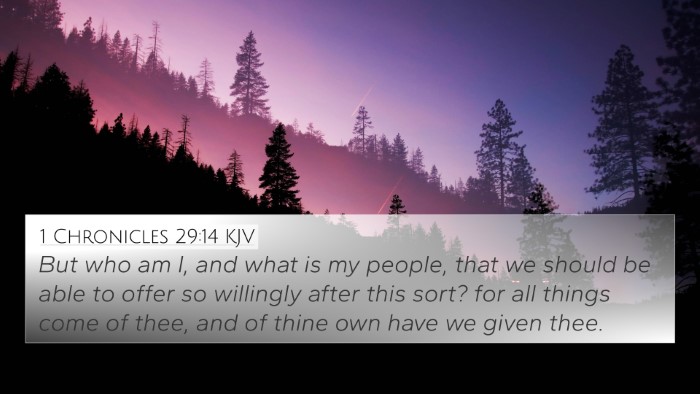Understanding Matthew 25:37
Bible Verse: "Then the righteous will answer him, 'Lord, when did we see you hungry and feed you, or thirsty and give you something to drink?'" (Matthew 25:37, NIV)
Context and Overview
This verse is part of the Parable of the Sheep and the Goats, a significant teaching of Jesus that addresses the final judgment. The righteous are surprised by their inclusion in the kingdom of heaven and seek clarification on their good deeds toward the Lord.
Commentary Insights
-
Matthew Henry:
Matthew Henry highlights the humility and surprise of the righteous. They did not realize that their acts of kindness towards others were directly serving Christ. This emphasizes the hidden nature of good deeds and their impact on eternal rewards.
-
Albert Barnes:
Barnes discusses the notion that the righteous, in their innocence, did not perceive their actions as serving Christ. This shows that true righteousness is often unselfconscious, and service to others is viewed as serving God.
-
Adam Clarke:
Clarke points out that the inquiry of the righteous reveals a heartfelt curiosity to understand their actions. They see themselves as merely fulfilling the basic human obligations of love and compassion, unaware that these reflect their commitment to Christ.
Key Themes
- The Importance of Service: The verse emphasizes that service to those in need is tantamount to serving Christ himself.
- Recognition of Christ in Others: The righteous didn’t recognize Christ in the needy, highlighting a theme of spiritual perception and understanding.
- Surprise in Judgment: The reaction of the righteous speaks to the unexpected nature of divine justice and reward.
Bible Verse Cross-References
This verse connects with multiple other scriptures that speak on the themes of compassion, service, and recognition of Christ in others:
- Matthew 10:42: "And if anyone gives even a cup of cold water to one of these little ones who is my disciple, truly I tell you, that person will certainly not lose their reward."
- Hebrews 13:2: "Do not forget to show hospitality to strangers, for by so doing some people have shown hospitality to angels without knowing it."
- Galatians 6:10: "Therefore, as we have opportunity, let us do good to all people, especially to those who belong to the family of believers."
- 1 John 3:17: "If anyone has material possessions and sees a brother or sister in need but has no pity on them, how can the love of God be in that person?"
- Proverbs 19:17: "Whoever is generous to the poor lends to the Lord, and he will repay him for his deed."
- Matthew 5:7: "Blessed are the merciful, for they shall receive mercy."
- Luke 6:31: "As you wish that others would do to you, do so to them."
- James 2:14-17: "What good is it, my brothers, if someone says he has faith but does not have works? Can that faith save him?"
- Isaiah 58:10: "And if you spend yourselves in behalf of the hungry and satisfy the needs of the oppressed, then your light will rise in the darkness, and your night will become like the noonday."
- Matthew 7:21: "Not everyone who says to me, 'Lord, Lord,' will enter the kingdom of heaven, but only the one who does the will of my Father who is in heaven."
Connections Between Bible Verses
Understanding the connections between Bible verses enhances our comprehension and application of scripture:
- Thematic Bible Verse Connections: This verse can be linked to the broader theme of serving others throughout the scriptures.
- Comparative Bible Verse Analysis: Analyzing this verse in conjunction with other teachings of Jesus, such as the Sermon on the Mount, can enrich our understanding of His overarching message of love and service.
- Scriptural Cross-Referencing: Utilizing tools like a Bible concordance can help identify further connections and deepens one's study.
Conclusion
Matthew 25:37 provides profound insight into the nature of righteous living and service. The explicit connections with other verses allow for a richer exploration of Christian doctrine regarding service, compassion, and the recognition of Christ in others. Engaging in Bible cross-referencing, whether through a systematic approach or through personal devotional study, facilitates a deeper understanding of faith and the practical application in believers’ lives.
